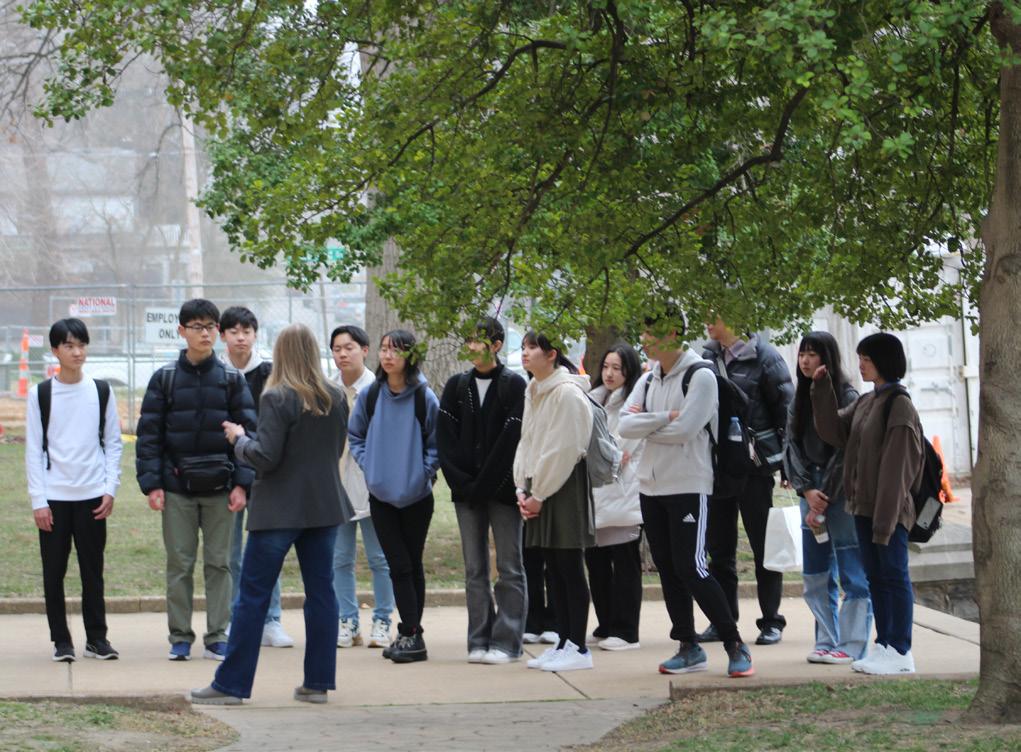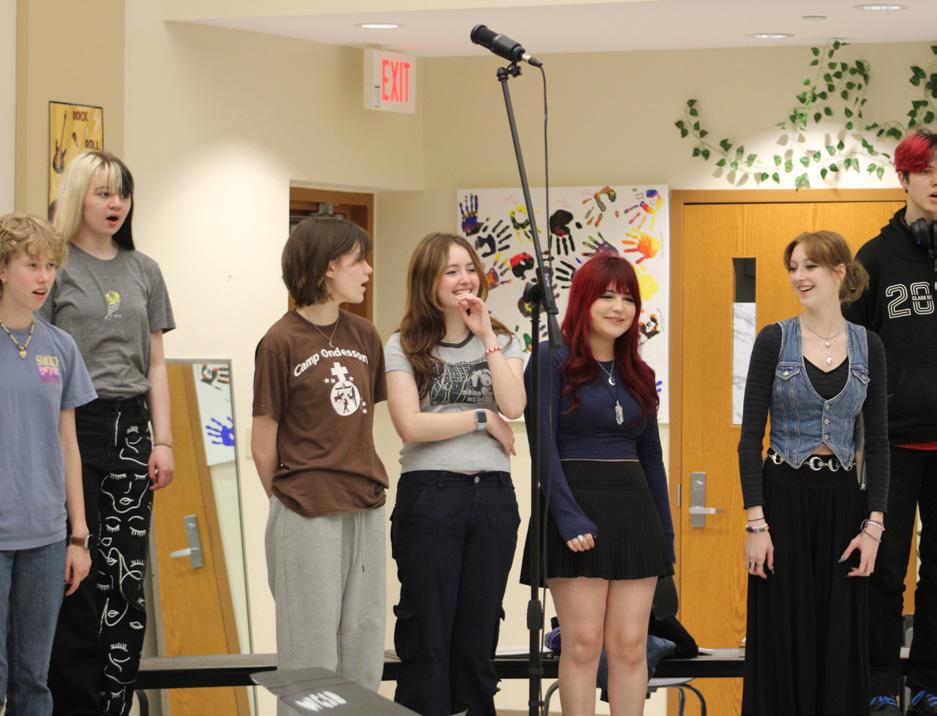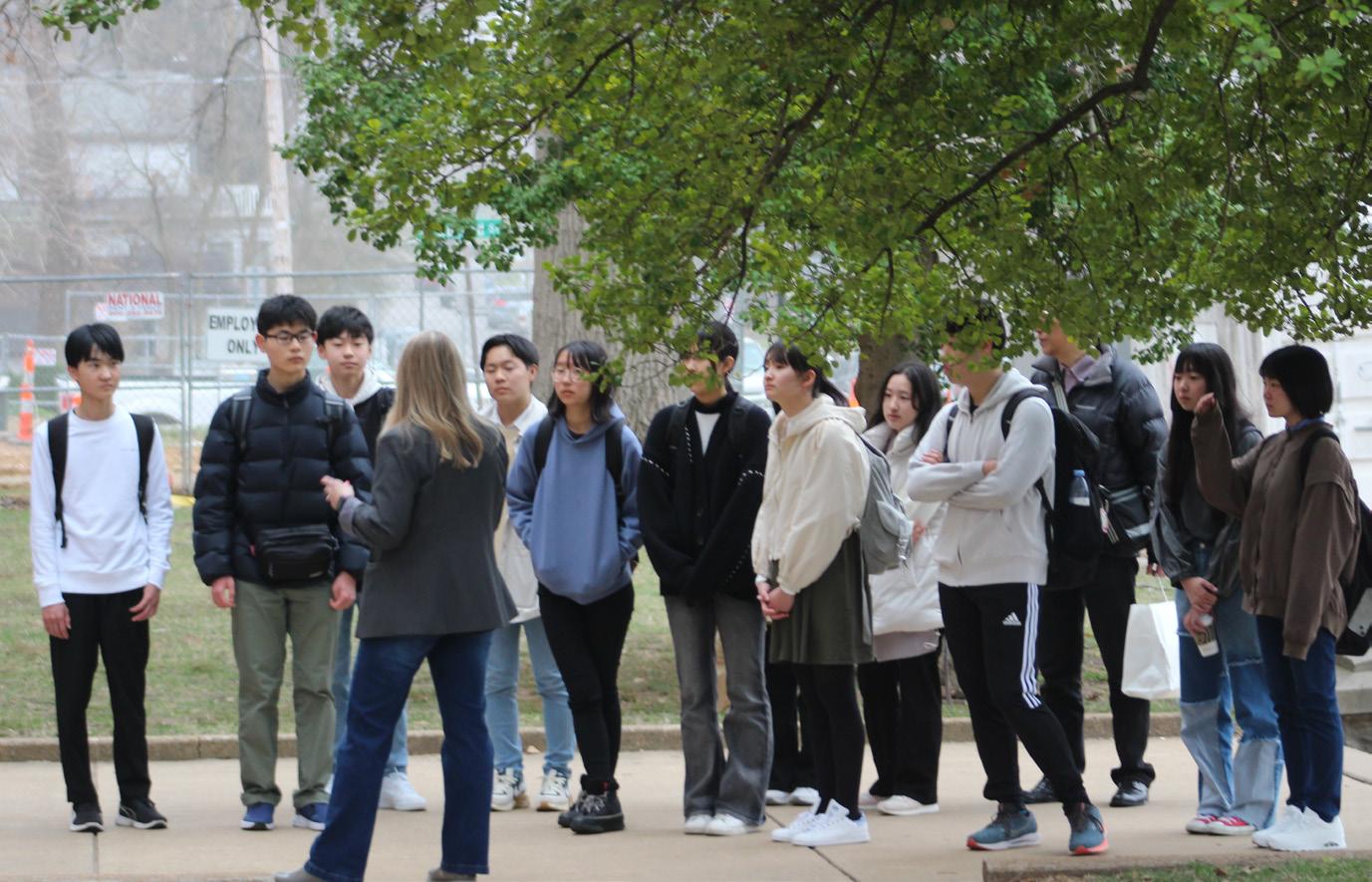
Staff
EDITOR-IN-CHIEF:
Hadley Hoskins
PRINT/PODCAST EDITOR:
Sam Klein
JUNIOR EDITOR:
Ali Schulz
SOCIAL MEDIA MANAGER/ GRAPHICS EDITOR:
Soledad Lee
VIDEO EDITOR:
Margaret Oliphant
NEWS/OPINION
EDITOR:
Arianna Peper
ENTERTAINMENT
EDITOR:
Margaret Korte
FEATURE EDITOR:
Jasper Winterton
ADVISOR:
Donald Johnson
SPECIAL
Baseball

THANKS TO FRIENDS AND FAMILY OF THE ECHO:
Melanie Bennett
Kim and Dan Emerson
Ariel Johnson
Keillyn Johnson
Anne and John Klein
Jenny Korte
Tracy Willis
SOME MATERIAL FROM TRIBUNE NEWS SERVICE
The Echo is a monthly publication of the newspaper staff of Webster Groves High School, 100 Selma Ave., Webster Groves, MO.
To contact staff members, call 314-963-6400 ex. 11157 or write to wgecho@wgmail.org. Unsigned editorials are the opinion of a majority of staff members; signed articles are the opinion of the writer

Letters to the editor of 300 words or less are welcome; submit letters by the 10th of the month to wgecho@wgmail.org, or room 155. All letters must be signed, although the name may be withheld from publication if requested. The Echo has the right to edit letters for publication as long as intent remains unchanged.



2 wgecho.org Table of Contents | March 2024 3 4 5 6-7 8 9 10 11 12
team anticipates victory
field Sophomore raises awareness about housing discrimination Attorney general sends cease-and-desist to district Students discuss:
to
pursues passion
baking Chamber choir performs at State competition
organizes Japanese exchange program ‘Mean Girls’ torn between ‘Bop’ or ‘Flop’
Phone policy should not be changed
on new
pressure
find perfect prom dresses Junior
for
Teacher
Editorial:
theecho
Cover Cutline: Junior Ellen Lueke, junior Shyla Reid and Freshman Martha Poppen perform “All That Jazz” from Chicago during the Broadway Revue on March 8.
Photo by Margaret Oliphant
Baseball team anticipates victory on new field
David Trampe Contributing Writer
Kopplin Field is getting a new look.
Kopplin Field has served as the baseball field since 1947 and has always been a dirt and grass field. Since 2021 improvements have slowly been made: new netting, dugout systems, and now a new turf field, which will be ready for the 2024 spring season.
Last year, the Statesmen finished with a 13-17 record, but with a new turf field, the team has high hopes.
Senior baseball player Joe Callas said, “I’m excited for the new turf. It should be really cool considering the shape the field was in before and allow much cleaner play and give us extra energy because it’s new.”
dence.
Senior Jackson Torbit said, “I feel pretty confident about the season. The team looks good, and we are very excited to be playing on our new field. I would say the biggest advantage is that with turf you get true hops off a ground ball. Sometimes fielding off dirt and grass can lead to a crazy hop and then an error which puts a runner on without the batter even doing anything.”
“I’m excited for the new turf, it should be really cool considering the shape the field was in before.”
- Senior Joe Callas
With surrounding schools having turf, Kopplin Field was becoming outdated.
A new field should boost performance or as senior Joe Callas said, “ More bombs will be hit.” Turf fields significantly reduce ground impact, allowing players to perform with greater confi-
The players have high expectations this year. Torbit said, “Last year we struggled to produce runs, so this year I think it will be very different.” Torbit said an improvement in pitching and scoring run abilities will be the biggest factor.
Kopplin Field was renamed from Plymouth after Corp. Richard Kopplin Jr. of the class of 1917. He was a WWI veteran who was one of 50 soldiers killed in July of 1918 defending the town of Linthal in the Alsace region. Kopplin was the high school’s first WWI soldier killed in action.
The turf was planned to be finished by April 1, but is on pace to be finished a few weeks early.. The turf has a total cost of $2,225,000, coming from Prop S. Other improvements such as new netting, and dugout systems cost $185,000.

Join us in Celebration of the Lord!
wgecho.org 3 March 2024 | Sports
Sophomore raises awareness about housing discrimination
Soledad Lee Social Media/Graphics Editor
“It’s the legal stuff… the wording that people just skim over and don’t really look at, that’s the biggest part of what needs to be changed,” sophomore Sam Enlund said.
Enlund began working on an impact project for the summer camp STL Changemakers in summer 2023 looking into Saint Louis’s history. Her focus though is specifically Webster’s history with racial restrictive covenants and communicating that to citizens.
The project began with Enlund connecting with Mayor Laura Arnold.
“My aunt connected me with the mayor. She’s friends with Mayor Arnold and knew about the project she was working on…I started working with her more and more on racial restrictive covenants and trying to get them amended in Webster Groves,” Enlund said.
Racially restrictive covenants are defined by Enlund as, “Language in housing deeds, that restricts where people can live. Specifically where black people could live in the 1940s, and that area of time. It added to the historical segregation, and the divide between white people and black people at the time.”
“More than 30 subdivisions in Webster Groves, with more than 1000 houses, have racially restrictive covenants as a part of their property deeds,” according to www.webstergrovesmo.gov.
Enlund focuses on communicating with the community members to encourage them to check if their housing deed has restrictive covenant; citizens can do this by contacting Enlund at sjenlund2008@gmail.com or going on the city website, www. webstergrovesmo.gov.
Keeping the history of the housing deeds is important to make

sure not to erase history; Enlund encourages citizens to release the covenants from their homes by changing the language on the deed that the language is wrong.
Although Enlund has been working on this in Webster, she isn’t the first person to look into this.

“I hopped onto a project that was already started. There was a WashU professor (Molly Metzger), that did a ton of research with students…There was one guy (history professor Colin Gordon of Iowa University) that worked pretty deeply into it and his main focus has been racial restrictive covenants and has made a map that maps out the entire Saint Louis area with all the racial restrictive covenants,” Enlund said.
Enlund also highlighted what she hopes Webster citizens will take from her project.
“The project was really about uniting Webster around its history. Moving Webster forward to be a more inclusive community… A community that recognizes its mistakes and recognizes backgrounds from people from all different walks in life,” Enlund said.
Overall Enlund has helped over 50 residents to become aware and make a difference.
4 wgecho.org Feature | March 2024
Sophomore Sam Enlund presents a sign displaying restrictive covenants in Webster Groves.
Photo provided by Sam Enlund
Attorney General sends cease-and-desist to district
Margaret Korte Entertainment Editor
Attorney General Andrew Bailey sent a cease-and-desist letter to superintendent John Simpson on Feb. 21, accusing the district of racial discrimination in their hiring practices.
According to Simpson, the letter was also sent to various news outlets. Lindbergh and Parkway districts also received letters.
Bailey said in the letter he’d received reports of the district’s attempts to hire a diverse staff. He said in the letter, “It has come to my attention that Webster Groves School District has instituted race-based criteria for its employees and applicants.”
The letter accused the district of “classifying employees and applicants based on race” for “hiring decisions.” He then went on to say that this violates the law under the Civil Rights Act.
Simpson said that throughout his run as superintendent, the goal has always been to hire a diverse group. “[Webster is] committed to trying to have a diverse faculty and staff, which is not unlike other districts.”
Despite this, there is no tangible policy or process in place to hire people of certain races over others as Bailey claimed.
According to Simpson, the district’s goal is always simply to hire “the best person.”
Director of diversity, equity and inclusion Shane Williamson said via email, “Webster Groves School District maintains a hiring policy that prioritizes the selection of the best candidates based on their qualifications, skills and experience.”
According to Williamson, her role as director of diversity is “to ensure diversity, equity, and inclusion are, and remain, at the center of the work of [the district]. We are also committed to fostering an inclusive and diverse environment where all individuals are valued and provided equal opportunities.”
Williamson said the district’s hiring practices aren’t different from others in St. Louis and beyond. “Our hiring practices are similar to what you see in school districts and employers across the re-
gion,” she said.
Simpson said that Bailey’s letter was largely unsupported and was based on reports rather than information that was fact-checked or experienced firsthand.
“What he does is he references just things he’s heard, instead of reaching out to us to say, ‘Hey, I heard you have this goal. This is what I hear you’re doing, tell me about it,’” Simpson said. “He instead sends a letter to us, and a bunch of media outlets, saying that what we do is we’re discriminating on the basis of race.”
willing to take the effort to attract, support and retain that staff,” Williamson said.
Bailey demanded the district cease alleged “race-based preferences and quotas,” then went on to say, “I am prepared to exercise my office’s full authority under the law, including the right to work free from the evil of racial discrimination.”
Simpson said the district didn’t feel the need to respond to the attorney general’s letter. “We felt it was so ridiculous that we didn’t even respond to him. It wasn’t really for our benefit. I believe it was for whatever he was looking to gain with the attention.”
“To plant in people’s heads that we’re discriminating, it’s reckless; it’s destructive,” -Superintendent John Simpson
In his letter, Bailey said he’s heard about discriminatory practices in the district. “According to the reports my office has received, the district adopted the goal to ‘attract, support and retain… staff who at a minimum reflect the diversity of our student population.’” He went on to say that “if these reports are true,” the district is guilty of racial discrimination.
“If he really was wanting to know about it, he would reach out to us and ask us about it—and he didn’t,” Simpson said.
As far as the accusation that the district’s goals to hire a more diverse staff are “discriminatory,” Simpson said, “We don’t see any way that what we’re doing and our stated goal and practices are discriminatory.”
“The Webster Groves School District is committed to fair and inclusive hiring practices. However, the district is interested in having a diverse faculty to serve as educators to our diverse student population and is
In general, Simpson said, “It’s frustrating. It takes time, it takes resources away from the district, and I just wish that, when somebody who has that title and has that reach as an attorney general, is going to say that the school district or school district leader or somebody is discriminatory, I think it’s irresponsible and reckless to not reach out to the person and learn more before you do that.”
“To me, it speaks to an intentionality of some to look to attack public education, and I feel public education is vital to our society. I feel like it’s the most important institution or important system that we have that can help or continue to improve the world and society, so to go on an attack, to spread the attack, to plant in people’s heads that we’re discriminating, it’s reckless; it’s destructive,” Simpson said.
wgecho.org 5 March 2024 | News
A.I. = Artificial Intelligence Newsprint = Real Intelligence

Students discuss: the pressure

to find the perfect prom dress
” Willis said.
“I would not want someone else to have the same dress as me. Especially if it’s someone I’ll be seeing a lot. I always worry about that for homecoming and stuff, so I think it’s a good idea,” said Kunze.
“I think it’s a smart idea, in case you’re buying from this decade, to make sure you’re not matching with anyone,” Schroeder agreed.
Students who didn’t mind duplicating a dress also agreed the idea was cute: “Personally, I don’t really care if someone has the same dress as me. I would probably just take a funny picture with them, but I think it’s cute for someone that actually does care, they can feel secure that no one else is going to steal their dress,” Beck said.
Collier added, “I really like the concept of it, that no one is going to wear the same dress… But at the same time, I also have in my head that when prom happens, we’re going to be gone in like a month. So if I match with someone, I don’t really care.”
All in all, the process to find a dress can take months.
“I started looking online in January, and then I went last weekend. I went to three different places before I decided I wanted it [in mid-February],” Collier said.
“[I’ve] just been looking around for the past couple months, but I found it at the end of last year. I just saw it going through DePop, and then I bought it from the real website,” Love said.
Despite the long process, students ended up with many different styles.
“I chose my dress because I thought it looked like Audrey Hepburn-ey, and kind of Old Hollywood,” Collier said.
“It’s vintage from the 90s because I had to get that,” Schroeder said.
“It’s pink, strapless and kind of tighter… It’s really cute and really my style I think. It’s what I want to portray myself as,” Beck said. “I’m really excited about it.”

 Art by Tania PerezLanderio
Art by Tania PerezLanderio
Junior pursues passion for baking
Sam Klein Print/Podcast Editor
Junior Cate Nakatani began her cookie baking and decorating business in her eighth grade year, working out of her own home with the support of her parents.
“I’ve always really loved baking, and I just tried cookie decorating for fun, and someone said I should sell them, so I start ed selling them,” Nakatani said about why she began her business.
Nakatani received support from her parents, especially in the be ginning of her business.
“My parents have always been super supportive in allowing me to do this and making it work. As far as ac tually cookie decorating, it’s mostly just me, but they defi nitely help with packaging,” Nakatani said.
Starting the business, Naka tani didn’t have the funds on her own and needed the help of her parents. Once the business got up and running, Nakatani was able to fund the business with the profits made from selling the cookies.
new experience when Nakatani decided to join Thrive. “Cate’s different. Because she has an established business, and she came with her own mentor, I didn’t have to get one for her,” Siebe said. “This is also the first time we’ve had someone who’s working by themselves.”
Because Nakatani’s business is already developed, she has a different focus than some of the other Thrive students that centers more around the financial part of

Nakatani said her busiest seasons are usually the fall and the summer, especially around graduation season.
Thrive is a business incubator done through the high school that allows students to gain experience in creating and running their own businesses. The opportunity is open to both juniors and seniors, and Nakatani took advantage of the chance as a junior.
“I chose to do Thrive to get more support on the business side of my business, and [to] be able to grow my business,” Nakatani said.
To work on expanding her skill and in the future her business, Nakatani has picked up a job as assistant pastry chef at Tony’s, an Italian restaurant in Clayton. Through her experience there she’s been mentored and learned how to bake and decorate other pastry items, such as cakes.
Nakatani splits her time between Thrive and Toni’s working on the two different aspects of her business.
Thrive advisor Kara Siebe was given a
complicated orders she gets take up to four-or-five days. It normally takes her about five-to-10 hours to finish a dozen cookies.
“I think if I go to college, I think I’m going to put my cookie business on pause or only do it during the summer,” Nakatani said.

Today, we had a banker come in and talk about finances and how to set up a business bank account, so that’s really where she’s getting the added support,” Siebe said.
For the baking part time management has become a challenge.
“Her business is booming. She has so many orders she has to turn people away which is remarkable. It’s almost at the point where she’s going to need to figure out how many orders can she take a month based on the time and detail that’s in the cookies,” Siebe said. “Lots of people know she exists and want her cookies because they taste amazing, and they look gorgeous. It’s just can she meet their demand?”
About how long each of the orders takes her Nakatani said the more
She added she would like to go to culinary school at some point to improve her skill and learn more about baking and the
“After college I would love to start like a whole storefront bakery eventually,” Nakatani said for her ultimate goal for her business. Siebe talks about a possibility of Nakatani moving into a commercial kitchen and expanding outside of her comfort zone with cookies. “She’s a professional in what she does. You can put her up there with any commercial baker, and she would stand above them,” Siebe said.
Nakatani promotes her business through her instagram page under the user bakersovenbycate where she posts photos of her different cookie decorations that range from birthday cookies to graduation party cookies.
The cost of an order is typically $3-$5 and sometimes more depending on the complexity of the design.

8 wgecho.org Feature | March 2023
Thrive Cookies made by Junior Cate Nakatani.
Photo provided by Cate Nakatani
Chamber choir performs at State competition
Margaret Oliphant Video Editor
Advanced choir students competed in the District singing and sight reading sheet music. The District competition is for students in the Saint Louis area at Parkway Central.
The winner will go to the State competition at Mizzou University. The groups perform in front of three judges who are also Saint Louis teachers on March 9.
The group received an exemplary score at districts and will go to the state competition on April 26.
Students will perform as a whole choir and in groups of two to four. Choir director Jaylen Davis picked collegiate level songs for students to sing. Choir songs’ difficulty is ranked on a scale of one to five, anything above five has complex rhythms and harmonies, a mix of different tempos and time signatures, which makes it collegiate level.
In order to prepare the choir is in what students referred to as “Choir Hell Week,” where they performed for a different di-
rector in order to get new critiques on their singing, which is referred to as a clinic, a concert on March 13, with solo and ensemble.
Groups were made of two-to-four students, songs were picked by Davis based on the singer’s abilities such as singing, sight reading, technique, hearing notes through a piano and leadership. Groups for the Solo and Ensemble competition have been preparing since February by practicing in and out of school, taking notes on their music and talking about lyrics of songs.

“A big part of singing is putting emotion into what you’re saying because playing in orchestra or in band you don’t get the advantage of saying words,” senior Leah Slaughter said.
In the State competition in 2023 Cham-
ber Choir got gold in singing, while getting the second highest score in sight reading.
This is the second and final competition of the year, after All State in January where the group received a superior score after competing against different high schools from around the state. and is organizing a competition in Spain next year.

wgecho.org 9 March 2024 | Feature
Part of the Chamber Choir rehearses on Wednesday, March 13.
Photo by Margaret Oliphant
Teacher organizes Japanese exchange program
Ali Schulz Junior Editor
Webster Groves hosted 12 Japanese students and one teacher from March 6, until March 16. This was part of an exchange between the United States and Suwa, Japan.
Teacher Betty Roberts helped organize activities for the Japanese students to participate in. Throughout their stay, the students got tours of WGHS, Webster, Rock Hill, Shrewsbury and Glendale. In addition, they met Mayor Laura Arnold.

The students also attended classes at the high school. On March 8, they traveled along with their

host students, but March 11, through March 14, the students will attend several elective classes throughout the day.
Old Webster Groves 111 W Lockwood Ave 314-395-6094
LeMacaron1StLouis@gmail.com
M-Sat 9am-10pm Sun 9am-9pm lemacaronstlouis of Saint Loius


“So many teachers have helped with this and volunteered to host the students in their classes. They include drama, dance, art, photography, AMPED, Foods and Electronics class. Dr. [Kerry] Arens will also host them one afternoon for team building activities,” Roberts said.
While Roberts was in charge of organizing the school side of things, the St. Louis-Suwa Sister City committee organized the host families. The
hosts had to provide a private room and meals for their students.
Senior Kyle Sidwell hosted a Japanese student during their stay. He decided to host a student because he was able to go to Japan for the Webster side of the exchange, and he wanted to be able to make sure the program continues on his side.
“Personally I am most excited to simply show my host brother around the United States and what makes us unique. Remembering how amazed I was by Japan, whether it be the architecture, food, daily life or education, I am most excited to try to replicate a similar experience for my host brother, especially now that I have seen what the exchange can look like going the other way,” Sidwell said.
Senior Hunter Farish, who hosted student Coco Miyazawa, shared similar thoughts.
“I would say that I’m most excited for Coco to gather a deeper understanding of American culture in a way that leaves a lasting impact and leads to further exchange between our two countries. Every country has its own little quirks and specialties, and I hope that Coco is able to gather a more personal understanding of these unique aspects of American life,” Farish said.
About what she is most looking forward to, Miyazawa said, “I’m very excited to see the zoo. I want to see many animals.”
The program has been renewed with this exchange, and Roberts hopes that it will continue with alternating outbound and inbound trips.
“This partnership allows students to apply to experience Japan first hand and also showcase our community here at Webster as a host family,” Roberts said.
10 wgecho.org Feature | March 2024
Macarons, Tarts & Cakes, Éclairs, Napoleon, Croissants, Lavazza Euro Coffees, Iced Drinks, Gelato, Fine Chocolates, & more! Come hang with us at Le Macaron!
Japanese students admire the Asian garden on their tour of WGHS led by Social Studies teacher Betty Roberts
Photo by Ali Schulz
‘Mean Girls’ torn between ‘Bop’ or ‘Flop’
Mia Willis Contributing Writer
A film adaptation of the Broadway musical “Mean Girls” was released in theaters Jan. 12.
While the reviews were very split, the movie was a box office success. This two-hour film-adaptation of the Broadway musical has made over $100 million so far, according to Variety.com.
While the genius casting of Renne Rapp ( “The Sex Lives of College Girls”) as Regina George was a crowd pleaser, some casting choices could have been better.
This film also featured Australian actress Angourie Rice (“Senior Year”) as Cady Heron. Her vocal performances left much to be desired, especially considering the powerhouse voice of Erika Henningson, who originated the role on Broadway. Rice’s vocal performances lacked emotion and her acting itself was fairly one-dimensional.

For fans of the original Broadway musical, it was certainly disappointing when some of the most iconic songs, such as “Where you Belong” and “Meet the Plastics” were cut. When making film adaptations of musicals, expectations are high, and this movie remake ceased to impress in that regard.
The new arrangements stripped the songs of their Broadway flair and pop-ified certain favorites. Heron’s iconic solo “Stupid with Love” sounded drastically different, as lines that were written to be belted out were done in an emotionless falsetto.
The movie was barely marketed as a musical, so certain viewers were confused when it wasn’t a straight re-make of the original film. For musical fans, it was disappointing to see such an iconic musical be dumbed down so that non-musical fans would enjoy.
While parts of the movie left viewers disappointed, it was undeniably very en-
tertaining. Cameos from Lindsay Lohan (original Cady) and Ashley Park (original Broadway Gretchen) were exciting to see for fans of both the 2004 movie and 2018 Broadway production. “Mean Girls” is a classic film, and it will be interesting to see how this 2024 adaptation stands the test of time. It is rated PG-13 for sexual material, strong language, and teen drinking.

wgecho.org 11 March 2024 | Entertainment
Photo from the official Mean Girls website
Phone policy should not be changed
As phones become an increasing problem in classrooms, Webster Groves High School is beginning to look toward taking steps to address the issue.
The current phone policy includes phones not being allowed within the classroom without explicit approval of the teacher.
The WGHS 2023-24 Handbook states, “If the electronic device is visible in class or causes a disruption in the class, the student will be referred to the office and assigned a consequence.”
Though this is in place, it is not universally enforced amongst classrooms.
English teacher Emily Pott said that as the year goes on, the current policy becomes harder to enforce and that a more universal policy throughout the school would help.
Pott said, “Even though my syllabus states one thing– students are in charge of their phones in the classroom. I will ask them to put phones away at certain times, but overall they are deciding when to use their phone. I want that policy to work; I think in theory juniors and seniors need to start practicing self-regulation skills, which is why I’m not a hammer about phones.”
On Monday, Feb. 26, principal Matt Irvin emailed a presentation to WGHS staff which contained information about possible phone policies to imply at the high school.
The presentation also contained the advantages and disadvantages of each policy option as well as the costs.
Irvin said, “The goal is to clarify the learning setting, and we are hearing from a lot of our staff that they would want something that is more stringent.”
The first phone policy option shown in the slideshow is to have students silence their phones and put them in a designated area; however, if a student needs to leave the classroom their phone must remain in the area it was placed at the start of class.
Of these options, there are several ways the school is looking at holding the phones such as a bin in each classroom which would cost $4,000-$6,000 for the whole school. Another option (that would cost $4000) is for each student to have a clear pencil case on their desk where their phone is placed face-down.
Another option the school is looking at is Yondr pouches, which are pouches to hold a phone that automatically lock when closed and require a circular magnet to unlock. This option would cost $43,000 for the entire school. However, if this were to be implied, the question of what students should do if an emergency situation occurs because the lock on the Yondr pouches requires a special magnet to open them.
According to U.S. News, nearly 350 school shooting incidents occurred across the United States in 2023.
If the high school was to implement one of these policies that take a student’s phone away or lock the phone where a student cannot access it, then if this – or any other emergency
situation– were to occur then the student could not contact their parents which would not be beneficial for student safety.
On Tuesday, March 12, in Orlando Florida, an Orange County High School went on lockdown for nearly three hours after there was a report of a suspicious person on campus. The report was cleared as unfounded and that there was no threat however before this was learned, during the lockdown, parents had trouble contacting their kids.
One mother of a student at the school, Shahid Kahn, said during the lockdown “I tried calling my son but the school policy doesn’t allow phones, so I can’t get his insight.”
Though the threat was cleared, this event shows how tak ing away a student’s phone can cause a risk if there were to be an emergency because the student is unable to contact their parents or guardians.
As for if a policy will be implemented at Webster, Irvin said, “I would say we are explor ing right now; looking at a bunch of different op tions and part of our process will be to work with Stu dent Allies, and we have processes where we typically engage with Stu dent Council.”
Irvin said in the past he has also gone to advisories and expects that they will approach the phone policy similar to how they polled students about continuing the Friendship Dance with Kirk wood.
“We just want to do the best we can for our students, and I think we’re trying to find what the answer might be,” Irvin said.
Art by Gracie Giles

12 wgecho.org Editorial | March 2024 Editorial













 Art by Tania PerezLanderio
Art by Tania PerezLanderio










